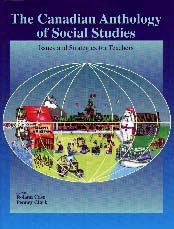


|
The Canadian Anthology of Social Studies: Issues and Strategies for Teachers.
Edited by Roland Case and Penney Clark. Subject Heading:
Professional.
**** /4
|

As an instructor of Social Studies Curriculum and Instruction courses at a Faculty of Education, I was pleased to be able to evaluate this anthology of issues and strategies for teachers. It was gratifying to find a valuable resource of 41 articles written by 27 teachers and teacher educators from across Canada.
The articles are divided into three sections. The first section deals with issues concerning the foundations of Social Studies, whether they are discipline-based, such as history or geography, or concern-based, as in global education or gender equity, or dimension-based, which relate to organizational approaches to the scope and sequence of the Social Studies curriculum. The second section contains articles on the following issues:
The articles, with their wealth of activities and excellent ideas, are valuable whether the reader is a student teacher, a practicing teacher or an instructor at a university. They deal with timely issues, and they connect theory with the practical in a way that allows for easy use in the classroom. The lists, pictures, questions, charts and references [supplementary and others such as Internet, films and slides] are easy to read and clearly outlined or positioned on the page. For the most part, many of the references mentioned are modern [within the last 10 years], useful and available. The articles are also beneficial in helping to plan and organize a program whether it is for a teacher education program or a yearly program for a school that will include all the skills required for the student at a particular level.
As I was checking for addresses to add to my list of useful references, I did notice that The Manitoba Social Science Teacher was listed as being in "Regina, Manitoba". I have found no other errors, but it does make one cautious about accepting the accuracy of other references without question.
To conclude, I would recommend this anthology for use as a text or as a reference guide for a practicing teacher. I will especially suggest that my student teachers use it as an excellent source of Canadian information on Social Studies strategies and issues.
Highly recommended.
Gary Evans is a sessional instructor of Social Studies Methods in the Faculty of Education, the University of Manitoba.
The third section deals with the practical aspects of instructional planning in regards to implementing the curriculum for the general level student; discussing the issue of integration and its various forms; using learning resources, whether they are textbooks, literature, pictures and other visual resources, or using community resources to teach Social Studies. A very practical segment of this section deals with student assessment.

To comment on this title or this review, send mail to cm@umanitoba.ca.
Copyright © 1998 the Manitoba Library Association.
Reproduction for personal use is permitted only if this copyright notice
is maintained. Any other reproduction is prohibited without
permission.
Published by
TABLE OF CONTENTS FOR THIS ISSUE - APRIL 24, 1998.
AUTHORS |
TITLES |
MEDIA REVIEWS |
BACK ISSUES |
SEARCH |
ORDER |
CMARCHIVE |
HOME
The Manitoba Library Association
ISSN 1201-9364